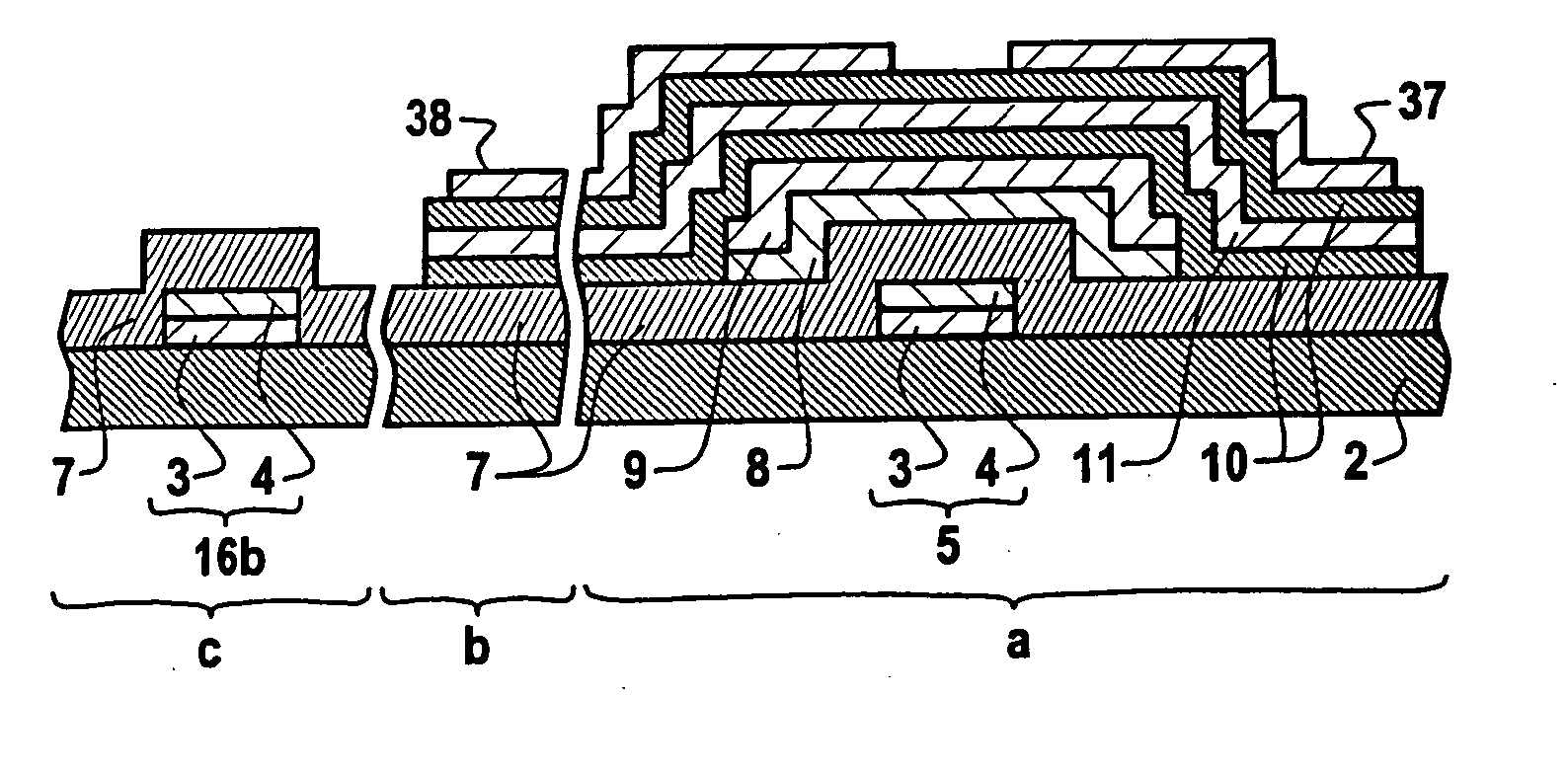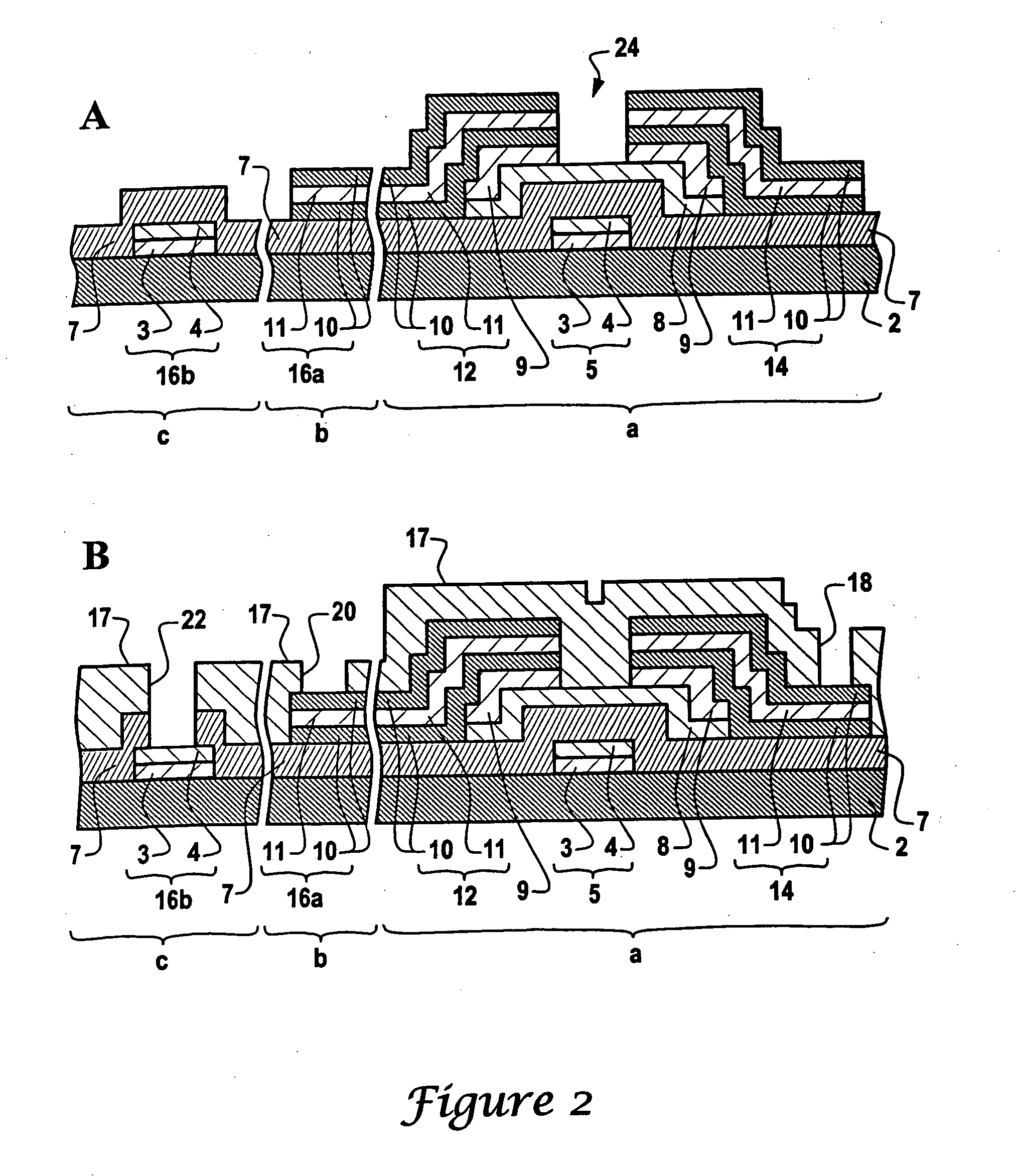Method of manufacturing a substrate for an electronic device by using etchant and electronic device having the substrate
a technology of electronic devices and substrates, applied in the field of etchant, can solve the problems and achieve the effects of poor yield, increased cost, and long manufacturing process
- Summary
- Abstract
- Description
- Claims
- Application Information
AI Technical Summary
Benefits of technology
Problems solved by technology
Method used
Image
Examples
embodiment 1
[0087] The relation between the HIO4content of an etchant, and the potential difference between the Al electrode and the Ti electrode is investigated by using the electrode-electric potential measuring instrument as follows.
[0088] Etchant is filled in a container, an Al electrode and a Ti electrode are immersed in the etchant as both electrodes, a voltage is applied by a source, and then the potential difference between both electrodes is measured. HF of 0.3wt %, H2SO4 of 0.1 mol / l (0.54 wt %) is used as the etchant, and HIO4 has range of 0.05 wt %-2.0 wt %. The result is shown in FIG. 8.
[0089] In the result shown in FIG. 8, in the case that the HF content of the etchant is 0.3 wt % and the H2SO4 content is 0.1 mol / l, if the HIO4 content is 0.6 wt % or less, the potential difference between the Al electrode and the Ti electrode (ΔE) should be 0.4V or less. In the case of having the potential difference (ΔE) of 0.4V, the weight ratio of HIO4 to HF is 2 or less so that the weight ra...
embodiment 2
[0090] The relationship between the HF content of the etchant and the potential difference between the Al electrode and the Ti electrode, and side etching amount (ΔL) when a stacked layer of the Al layer and Ti layer is etched by using the etchant, is investigated as follows.
[0091] In the HF content of the etchant and the potential difference between the Al electrode and the Ti electrode, embodiment 2 is same as embodiment 1 except that the HIO4 content of the etchant is 1.5 wt %, H2SO4 is 1 mol / l (5.4 wt %) and HF is 0.1 wt %-0.8 wt %. The result is shown in FIG. 9.
[0092] And, the side etching amount is measured when a stacked layer formed from an Al layer having a thickness of 1300 Å and a Ti layer having a thickness of 500 Å is uniformly etched by using the etchant.
[0093] The result is shown in FIG. 10.
[0094] In the results shown in FIG. 9 and FIG. 10, in the case that the HIO4 content of the etchant is 1.5 wt %, and H2SO4 is 1 mol / l, if the HF content is 0.65wt % or more, th...
embodiment 3
[0095] Embodiment 3 is same as embodiment 1 except that the HIO4 content of the etchant is 0.05 wt %, HF is 0.03 wt % and H2SO4 is 0 wt %-0.54 wt %, as the H2SO4 content of etchant and the difference in potential between Al electrode and Ti electrode.
[0096] The result is shown in FIG. 11.
[0097] In the result shown in FIG. 11, in the case that the HF content of the etchant is 0.03 wt % and the HIO4 content is 0.05 wt %, if H2SO4 were 0.05wt % or less, the potential difference between the Al electrode and the Ti electrode (ΔE) becomes 0.4V or less. Therefore the lower limit of the weight ratio of H2SO4 is 0.05 wt %.
[0098] As mentioned hereto, an etchant according to the present invention has the advantage that each metal layer composing a stacked layer of a Ti layer or Ti alloy layer as another metal layer accumulated on an Al layer or Al alloy layer having low resistance can be etched to a substantially equal etching rate by only etching the structure one time.
[0099] Also, accord...
PUM
| Property | Measurement | Unit |
|---|---|---|
| Electric potential / voltage | aaaaa | aaaaa |
| Weight ratio | aaaaa | aaaaa |
| Electrical resistance | aaaaa | aaaaa |
Abstract
Description
Claims
Application Information
 Login to View More
Login to View More - R&D
- Intellectual Property
- Life Sciences
- Materials
- Tech Scout
- Unparalleled Data Quality
- Higher Quality Content
- 60% Fewer Hallucinations
Browse by: Latest US Patents, China's latest patents, Technical Efficacy Thesaurus, Application Domain, Technology Topic, Popular Technical Reports.
© 2025 PatSnap. All rights reserved.Legal|Privacy policy|Modern Slavery Act Transparency Statement|Sitemap|About US| Contact US: help@patsnap.com



